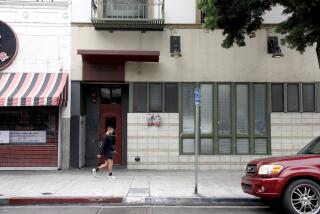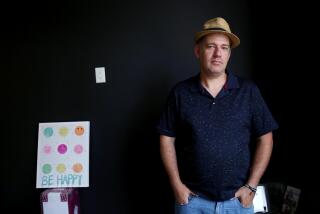Drama of Developer’s Soured Success Story Unfolds at Fraud Trial
- Share via
In the 1960s, Gerald Francis Goeden was a carpenter who dreamed of building beautiful houses on majestic landscapes. In the 70s, he made it happen.
He started with just one house, and became a major developer based in Irvine with 125 employees. Bank after bank stood ready to loan him money. When Goeden was at his peak, his houses were springing up so fast--in San Juan Capistrano, Laguna Niguel, the Orange foothills--that it took nine people to keep the books for him.
“We thought we could do it all,” said Betty Jo Goeden, the wife who started the company with him.
Worst to Come
But in the 1980s, the Goeden bubble burst.
His company went bankrupt. Betty Jo divorced him. Lawsuits against him--from homeowners, subcontractors, bank executives--came in an avalanche of nearly 150 separate civil actions. The self-made millionaire fell to near poverty.
But the worst could be yet to come. Orange County prosecutors say Goeden was not only a bad businessman but a crooked one.
Goeden, now 48, is on trial in Superior Court in Fullerton charged with more than 20 counts of grand theft by fraud, and illegal diversion of bank-loan money. If convicted, he could face up to eight years in state prison and be fined $10,000. Goeden’s lawyers say their client is innocent.
The jurors, who have heard testimony for a month, have been taking copious notes. Deputy Dist. Atty. Mark A. Sevigny has flooded them with charts and documents concerning arrangements, housing contracts and contractor agreements.
The prosecutor has depicted Goeden as an ambitious, arrogant developer who betrayed not only the people who bought homes from him but the bankers who doled out hundreds of thousands of dollars to help him build his tracts.
Goeden so mingled the homeowner payments with other money, Sevigny has said in court papers, that “they were profits of water put into a sea that no longer could be identified.”
The felony counts cover a range of activities:
* Grand theft, alleging he failed to pass on to banks the homeowner payments for the Crown Royale tract in Laguna Niguel.
* Diversion of construction loan funds from the Bank of America for other uses.
* Bad checks to the E.F. Hutton Group Inc. of New York. The checks totaled $440,000 drawn on an account with $2,200.
* A variety of theft and diversion counts involving United California Bank (now First Interstate Bank). Prosecutors say much of the money meant for construction wound up in the commodities market at the Chicago Mercantile Exchange.
Blames Recession
Goeden blames his troubles on the 1982 recession and rising interest rates.
“The only thing Mr. Goeden is guilty of,” his lawyers say in documents to the court, “was trying to find a way around the zooming interest rates and upside-down real estate market in order to salvage (his) projects.”
Goeden and his two Los Angeles lawyers refused to answer any questions about the case. But strongly supporting him are his former wife and their four children.
“Mr. Goeden has done nothing wrong,” she said in an interview. “I know, because I lived this with him. I was there when it all started.”
It started when two adventurous teen-agers, newly married, decided to move from Minnesota to California.
“We were young and looking for that golden opportunity you’re supposed to find in California,” she said. “We didn’t know anyone here. But we didn’t care.”
They settled in Long Beach, she said, because it looked so inviting on the map. In the early 1960s, her husband, a welder, took a course in carpentry at Orange Coast Community College.
“Carpentry was always his love, even after he was running his own company,” she said.
First they started a framing company, working as subcontractors on other people’s housing projects. Then they gradually acquired lots of their own and built houses on them.
“I can’t believe when I hear people talk about how we were overnight successes,” Betty Jo Goeden said. “We would buy a lot here, a lot there. We’d build, and the company slowly grew.”
The homes they built were primarily the middle-income variety in Fountain Valley and Huntington Beach. They lived in a Fountain Valley home Goeden built himself. They even bought some apartment units to upgrade. But Goeden wanted in on the housing boom in South County, and he wanted to build higher-priced homes. He hired more people and spread his business to more banks.
Advertised to Prospects
In San Juan Capistrano, Goeden advertised to prospective buyers: “Capistrano Royale sits majestically on 192 acres of rolling hills. . . .” His brochures pushed the area’s “moderate winters and ideal summers, with gentle ocean breezes.”
The home prices in Goeden’s three new tracts, including Crown Royale in Laguna Niguel and Vista Royale in Orange, began at $300,000, and buyers could choose from seven styles: the Marquis, the Baron, the Chancellor, the Monarch, the Sovereign, the Royalist, and the Kingship. Goeden created a subsidiary firm, just for the sales.
But the country’s declining economy in the early ‘80s jolted the Goeden Co. Goeden couldn’t sell his homes fast enough to provide income to pay off his lenders and his contractors.
The first of the criminal charges against him emerged from what his lawyers say was a “creative financing” plan for home buyers. It was an inducement to help those who could not afford conventional financing because of rising interest rates.
Goeden agreed to subsidize such buyers, essentially paying about half their payments for the first two years. The homeowners would make their payments to Goeden, who would hold the money in trust until time to make the monthly payments to the banks. At that time, he would pass on the home buyer’s share, plus his matching share.
But in November, 1982, Redlands Federal Savings & Loan sent out default notices to numerous home buyers in the Crown Royale tract. The bank had not been paid by Goeden for four months.
One Crown Royale homeowner, Jack Tatum, testified at a pretrial hearing that he called Goeden to ask what had happened to his money. He said Goeden told him he had needed it “for other things.”
Bank officials have testified that Goeden told them he had “a cash-flow problem.”
Two-Pronged Argument
His lawyers provide a two-pronged argument to show he never had any criminal intent: He bought an insurance policy to protect the homeowners in case the Goeden Co. ever defaulted, and Goeden eventually made good on all the payments to the bank. And that includes, they point out, covering the homeowners’ share even after the angry homeowners hired a lawyer who told them to not make any more payments to Goeden.
Some of these homeowners, who sold their property at a profit, ended up living in them a year or more virtually rent-free, Goeden’s lawyers argued.
But prosecutor Sevigny has countered that “restitution is no defense.” The crime occurred, Sevigny claims in court papers, when Goeden deliberately used the homeowners’ money for other company purposes, and when he did not set up the trust for that money as promised.
Goeden had other troubles, such as trying to pay contractors with so little money coming in.
“There were a lot of liens, but it was a snowball effect,” Betty Jo Goeden said. “The banks wanted their money, the subcontractors were hurting. None of us could have predicted what was going to happen to the economy. It was the worst thing since (the stock market crash of) ’29.”
The Goeden Co. received its first embarrassing publicity on Dec. 17, 1982, when Pamela Ayers, an interior designer, armed with a court order and accompanied by three deputy marshals, pulled up with a moving van and packed off all the furnishings from the development’s seven spacious model homes at Capistrano Royale at Highland Drive and Rancho Viejo Road. Ayers said the furniture was hers and she hadn’t been paid.
Goeden had problems on other fronts. Prosecutor Kaz Makino claimed at Goeden’s preliminary hearing that the developer “essentially had taken a bath to the tune of $3 million in the commodities market.”
Prosecutors have tried to show that in the spring of 1982, Goeden “laundered” construction loans through various bank accounts.
“Funds from loans used to pay E.F. Hutton for commodities futures were transferred to other corporate bank accounts so that the original source of payment could not be directly traced,” Sevigny claims in his court papers.
Yet to Present His Side
Goeden’s lawyers have yet to present his side at the trial. In documents so far, they have said it was not unreasonable for Goeden to invest in lumber commodities, since lumber was a major part of his business.
Goeden’s financial problems and the mounting lawsuits took their toll. The company’s assets and the number of employees dwindled, and there were no new projects.
In January, 1984, Goeden filed for bankruptcy. And Goeden was soon the target of a major Sheriff’s Department investigation.
In April, 1985, Goeden and his wife were arraigned on criminal charges, though the case against Betty Jo Goeden eventually was dismissed. The same month, the couple separated. Their divorce became final in 1988, with Goeden agreeing to pay $500 monthly in child support for the last child left at home.
At times, court proceedings between the two were messy--Betty Jo Goeden claimed in court papers that she was hospitalized after he beat her in 1983. At one point after the separation, she was granted a restraining order from the court to force him to stay away from her.
But Betty Jo Goeden says now that the pressures of the business problems affected their home life.
“We’re all products of our environment, and those were very painful times for us, too painful to even talk about today,” she said.
Goeden listed his income for last year in divorce papers at less than $600 a week, which he received for working for a firm called Monarch Ventures. To her knowledge, Betty Jo Goeden said, her husband no longer owns any property. She would not discuss his financial arrangement with his lawyers. But his lawyer after his arrest, Paul E. Mast, left the case last year, complaining that Goeden could not afford to pay him.
Betty Jo Goeden claims that her husband is the victim of at least one disgruntled employee, and of many bad breaks. She related:
“We worked hard, so hard you can’t believe; but we enjoyed what we were doing. I don’t think we gave a thought that it might ever come to an end.”
More to Read
Inside the business of entertainment
The Wide Shot brings you news, analysis and insights on everything from streaming wars to production — and what it all means for the future.
You may occasionally receive promotional content from the Los Angeles Times.









